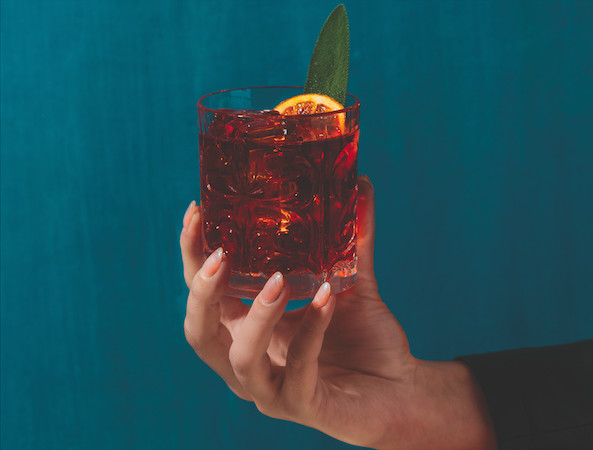
UK drinkers have been braving the elements as bars have been allowed to open outside. Will this lead to a boom in aperitif- style drinks, Amy Hopkins asks.
There are well-known signs that aperitif hour is underway – the pleasing pop and effervescent fizz of champagne, the hedonistic clinking of luminous ice-filled goblets, the sight of jewel- coloured Negronis and Americanos
sitting alongside plates of olives and artisan breads. The aperitif category (aperitivo to the Italians) is a
broad church, encompassing a multitude of styles that mostly originated in continental Europe. A uniting feature is that these light-bodied, appetite- stimulating drinks remain closely associated with the pre-dinner drinking occasion.
For our European cousins, this occasion has long been a cultural norm; in the UK, aperitif hour is a relatively new phenomenon, but as consumer drinking habits become more discerning and slower paced, the movement is spreading fast. And now it seems the UK’s post-lockdown environment could add fuel to this growing trend.
Last month, as the government tentatively eased coronavirus restrictions – though ordered indoor drinking and dining venues to remain shuttered – drinks terraces popped up just as springtime tulips bloomed, creating the ideal conditions for aperitif appreciation.
Could this widespread move to alfresco drinking and dining mean aperitifs will become more deeply embedded in UK drinks culture?
Dariush Afshar Haghighi, co-founder of The Watermark bar in Leeds, observes that after months cooped up indoors with limited travel options, people have been craving escapism. In this sense, aperitifs can have a transportive effect. “We are just trying to kid ourselves that we are sat outside next to the Mediterranean,” he says.
As people reconnect with loved ones, they are opting for lighter alcohol options such as Spritzes, says Steve Georgiou, head bartender at The Wigmore in London, which opened a new outdoor space in April. “Coming out of lockdown I think everyone is more focused on catching up with friends and enjoying tasty food and drink rather than just trying to get drunk as quickly as possible,” he says.
Essential serves
People have also become more inclined to drink for longer periods during the day, leading to greater demand for sessionable beverages, says Greg Almeida, of Publiq in London. “We believe every menu should have aperitif drinks... Like non- alcoholic options, they are essential if you aim to answer the varied needs of your guests,” he says.
Aperitif cocktails – particularly Spritzes – are relatively easy to make, and as such were popular among amateur bartenders during lockdown. Now that they can visit bars once more, Haghighi says customers are keen to try “elevated” serves. “It’s mix of Hendrick’s gin, Discarded Cascara vermouth, strawberry purée and Provence rosé.
At The Gibson in London, its ‘hero drink’ – the Martini – is presented in sparkling, savoury, aged, low-abv, warm, and non-alcoholic formats. “[Aperitif is] a category that can have a very classic approach but also bartenders can play with it in many ways, creating more herbal, citrussy styles, using different garnishes and different types of glass,” says The Gibson managing director Marian Beke.
Versatile and adaptable
Publiq’s Almeida claims that the simple act of switching brands in a particular apéritif cocktail will also “make cocktails entirely different”. The bar team at Publiq, for instance, recently acquired some biodynamic vermouth, which is used in a variety of classic aperitif cocktails.
The versatility and adaptability of aperitif cocktails could allow the category to expand its appeal further, and perhaps deseasonalise. While aperitifs tend to be associated with warmer climes, their popularity is not necessarily weather dependent, believes Michael Sodeau, co-founder of London’s Vermuteria. “One of our busiest months last year was October and all the seating was outside... people would dress up like it was après ski,” he says.
It also makes financial sense for bars to feature a good selection of aperitif drinks. Haghighi notes the limited time it takes build a Spritz, while Almeida says “the gross profit on these drinks tends to be extremely good for businesses”.
Going forward, if the bars that have created new terraces for post-lockdown service keep these outdoor spaces open, there’s a good chance the aperitif trend will snowball even further in the UK. Haghighi thinks alfresco drinking “could be the future of The Watermark, and maybe our menu will reflect that”.
If a roadside bar in Leeds is considering such a move, surely the long-term potential of aperitifs in the UK is boundless.


